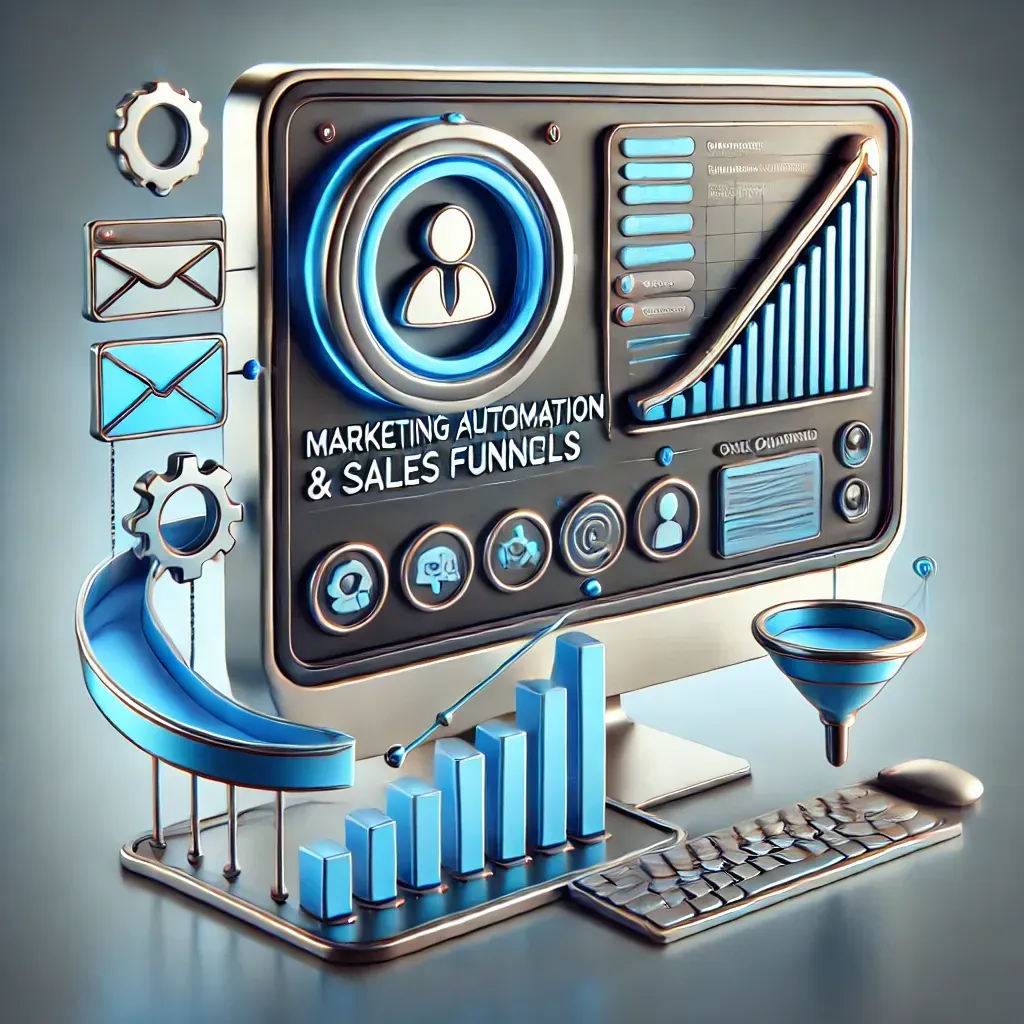
CRM Management
Automate your marketing campaigns and sales processes with ease. Create optimized sales funnels, automate email and SMS marketing, and generate high-quality leads, all while saving time and improving efficiency.
1. Centralization of Customer Data
A CRM system centralizes all relevant customer information in one place. From contact details to past interactions, purchases, and preferences, you can have immediate access to all the data you need to interact with customers efficiently. This eliminates the need to search through different platforms or databases, saving time and effort.
Contact Management: You can store and organize all your customers' contact data, such as name, email, phone number, addresses, etc., making communication quick and effective.
Interaction History: The CRM records all past interactions with customers, whether through email, phone, chat, or even social media. This allows you to have complete context when contacting them, avoiding information repetition and improving service quality.
2. Marketing and Sales Automation
Marketing and sales automation is one of the most powerful features of a CRM. With a well-integrated CRM system, you can automate repetitive tasks such as sending personalized emails, follow-up reminders, and generating qualified leads. This allows your team to focus on higher-value tasks while the CRM handles the heavy lifting in the background.
Customer Segmentation: The CRM allows you to segment your database based on various criteria like location, interests, purchase history, and more. This lets you send targeted messages to relevant groups, increasing conversion chances.
Automated Email Campaigns: You can set up automated email sequences that are sent at key moments during the customer journey. For example, a welcome email when a customer signs up, or a reminder for an abandoned cart.
Lead Scoring: The CRM can also automatically score leads based on their behavior (email opens, link clicks, website visits), allowing you to prioritize those who are most likely to convert into customers.
3. Sales Tracking and Opportunities
With a CRM, you can track each sales opportunity from the first contact to closing the deal. This allows you to better manage your sales funnel, ensuring no important opportunities are lost.
Visual Sales Funnel: CRM systems often include visual funnels that allow you to see where each prospect is in the buying process. This provides a clear view of where opportunities are getting stuck and helps prioritize actions to move them through to closing.
Tasks and Reminders: The CRM lets you set tasks and reminders so your sales team never forgets to follow up on time. These automatic reminders ensure each prospect is attended to promptly, improving efficiency and reducing the chance of losing a sale.
Sales Reports: The CRM generates detailed reports on your sales team's performance, showing key metrics like conversion rates, average deal value, and sales cycle time. This lets you identify areas for improvement and make data-driven decisions.
4. Integration with Other Systems
An effective CRM doesn’t operate in isolation; it must integrate with other key tools your business is already using, such as email platforms, social media, payment systems, and more. Seamless integration ensures that customer information is always up to date and prevents duplicated efforts.
Integration with Email and Social Media Platforms: A well-integrated CRM can connect with platforms like Gmail, Outlook, Facebook, LinkedIn, and others, centralizing all customer information in one place, regardless of where the interaction took place
.Connection with Payment Platforms: If you have an online store, the CRM can connect to payment platforms like PayPal, Stripe, or your payment system to track customer purchases, giving you a clearer view of their buying behavior and simplifying follow-ups.
5. Analytics and Reporting
The ability to analyze data and generate detailed reports is essential to understand how customer interactions are performing and which areas of your business need attention. Modern CRMs offer a range of analytical tools that provide valuable insights for making informed decisions.
Customizable Reports: You can create reports tailored to your specific needs, such as sales reports, customer behavior, marketing interactions, and more. This lets you spot trends and opportunities.
Predictive Analytics: Some advanced CRMs even use predictive analytics to forecast customer behavior, such as the likelihood of a customer converting to a sale or abandoning their cart. This helps you make proactive decisions to improve your outcomes.
Benefits of Implementing a CRM
Improved Customer Relationship: Having all customer information organized and accessible allows for more personalized interactions, which enhances customer satisfaction and strengthens long-term relationships.
Increased Efficiency: Automating repetitive tasks like email sending and data updates frees up time for your sales and marketing team to focus on higher-value tasks.
Better Decision Making: Access to detailed reports and key data on customer behavior allows you to make informed decisions that can improve your sales and marketing strategy.
Optimized Sales Team Performance: Tracking opportunities and organizing sales tasks in one place helps your team stay focused and close more deals effectively.
Considerations When Implementing a CRM
Team Training: It’s crucial that your team receives training on how to effectively use the CRM system to make the most of its features.
Data Maintenance: The quality of data is crucial in a CRM system. It’s important to keep the database up to date and ensure records are accurate.
Integration and Customization: Make sure the CRM integrates well with your other business tools and is customized to meet your specific needs.
Copyright© 2024 Getweb.solutions by Benitez.digital



